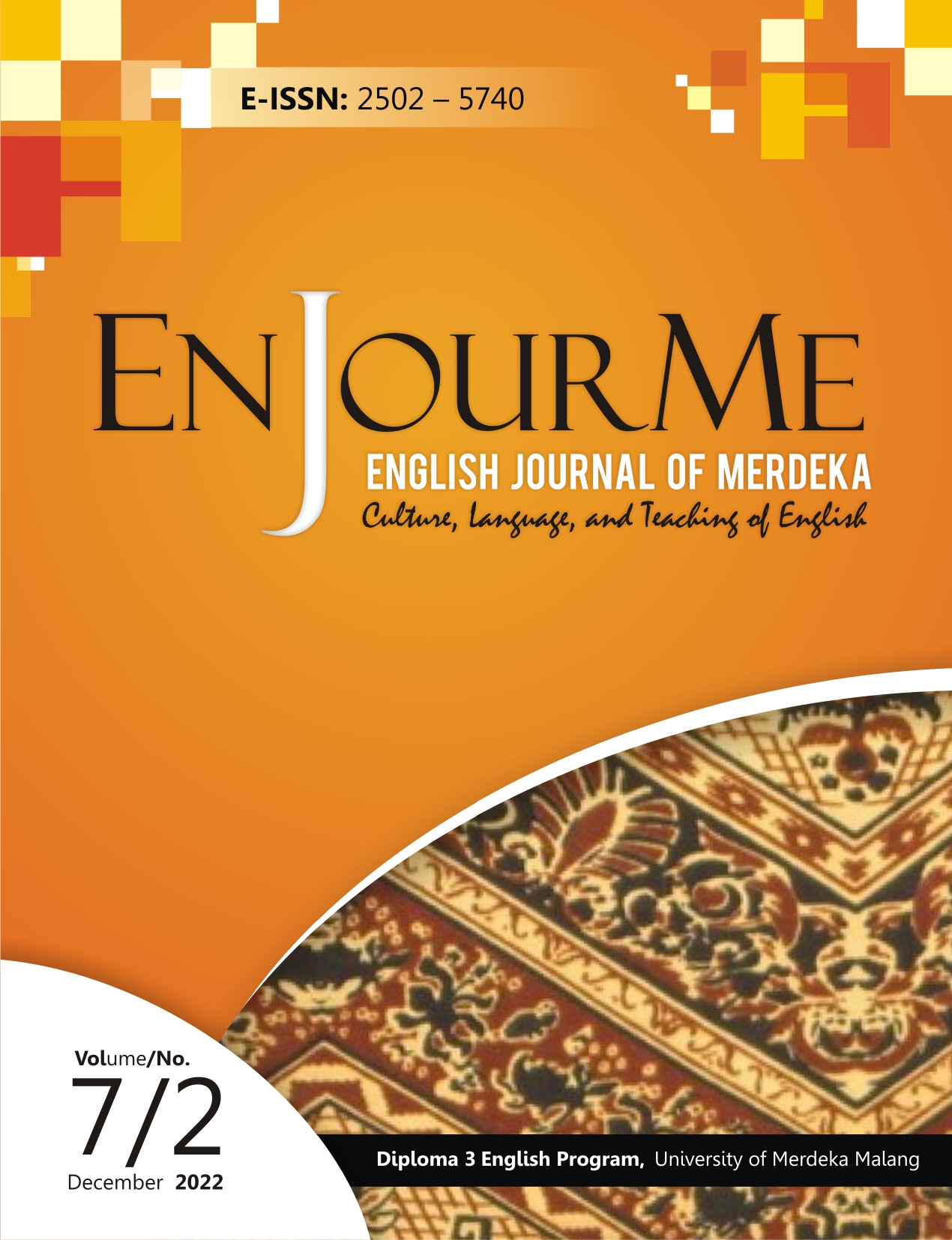It’s adu penalti man!: Understanding the translingual practices of an Indonesian family living in the US
DOI:
https://doi.org/10.26905/enjourme.v7i2.8990Keywords:
Identity, multilingual, translingualism, translingual practiceAbstract
This study examines the kinds of translingual negotiation strategies practiced by an Indonesian family living in the US. This study involved a father and son, natives of Indonesia, who had been in the US for many years. The father and son usually mix and mesh English, Indonesian, and Javanese when communicating. Two kinds of data were collected; the daily talks between the father and son were audiotaped, and follow-up interviews with the father and member checking were used to triangulate the data. The data reveals that the father and son indeed practiced Canagajarah’s (2013b) four translingual negotiation strategies: invoicing, recontextualization, interactional, and entextualization. Additionally, the interview reveals some of the father’s goals with his son’s language learning and literacy in their mother tongue.Â
DOI:Â 10.26905/enjourme.v7i2.8990
Downloads
References
Atkinson, D., Crusan, D.J., Matsuda, P.K., Ortmeier-Hooper, C., Ruecker, T., Simpson, T., & Tardy, C.M. (2015). Clarifying the relationship between L2 writing and translingual writing: An open letter to writing studies editors and organization leaders. College English, 77(4), 383–386.
Canagarajah, S. (2011). Codemeshing in Academic Writing: Identifying teachable strategies of translanguaging. The Modern Language Journal, 95(3), 401–417. https://doi.org/10.1111/j.1540-4781.2011.01207.x
Canagarajah, S. (2013a). Negotiating translingual literacy: An enactment. Research in the Teaching of English, 48(1), 40-67.
Canagarajah, S. (2013b). Translingual practice: Global Englishes and cosmopolitan relations. New York: Routledge.
Canagarajah, S. (2015). Clarifying the relationship between translingual practice and L2 writing: addressing learner identities. Applied Linguistics Review, 6(4), 415–440. https://doi.org/10.1515/applirev-2015-0020
Canagarajah, S. (Ed.) (2013c). Literacy as translingual practice: Between communities and classrooms. New York: Routledge.
Horner, B., Lu, M.-Z., Royster, J. J., & Trimbur, J. (2011). Language difference in writing: toward a translingual approach. College English, 73(3), 303-321.
Gonzalez, N., Moll, L. C., & Amanti, C. (2005). Funds of knowledge: Theorizing practices in households, communities, and classrooms (1st ed.). Routledge.
Jain, R. (2014). Global Englishes, translinguistic identities, and translingual practices in a community college ESL classroom: A practitioner researcher reports. TESOL Journal, 5(3), 490–522. https://doi.org/10.1002/tesj.155
Lee, M. E. (2013). Shifting to the world Englishes paradigm by way of the translingual approach: Code-meshing as a necessary means of transforming composition pedagogy. TESOL Journal, 5(2), 312–329. https://doi.org/10.1002/tesj.121
Lu, M.-Z., & Horner, B. (2013). Translingual literacy and matters of agency. In A. S. Canagarajah (Ed.), Literacy as translingual practice: Between communities and classrooms (pp. 26-38). New York: Routledge.
Matsuda, P. K. (2014). The lure of translingual writing. PMLA/Publications of the Modern Language Association of America, 129(3), 478–483. https://doi.org/10.1632/pmla.2014.129.3.478
May, S. (2012). Language and minority rights: Ethnicity, nationalism and the politics of language (Second ed.). New York: Routledge.
Motha, S., Jain, R., & Tecle, T. (2012). Translinguistic identity-as-pedagogy: Implications for language teacher education. Journal of Innovation in English Language Teaching and Research, 1(1), 13-28.
Pacheco, M. B., Daniel, S. M., Pray, L. C., & Jiménez, R. T. (2019). Translingual practice, strategic participation, and meaning-making. Journal of Literacy Research, 51(1), 75–99. https://doi.org/10.1177/1086296x18820642
Watson, M. (2021). The inevitable mess of translingualism. Pedagogy, 21(1), 83–107. https://doi.org/10.1215/15314200-8692703
Additional Files
Published
How to Cite
Issue
Section
License
Authors who publish with this journal agree to the following terms:
(1) Copyright of the published articles will be transferred to the journal as the publisher of the manuscripts. Therefore, the author confirms that the copyright has been managed by the journal.
(2) Publisher of EnJourMe (English Journal of Merdeka) : Culture, Language, and Teaching of English is University of Merdeka Malang.
(3) The copyright follows Creative Commons Attribution–ShareAlike License (CC BY SA): This license allows to Share — copy and redistribute the material in any medium or format, Adapt — remix, transform, and build upon the material, for any purpose, even commercially.




